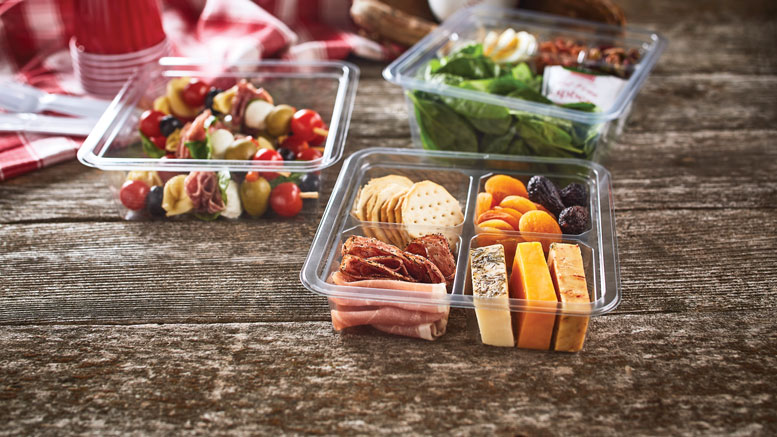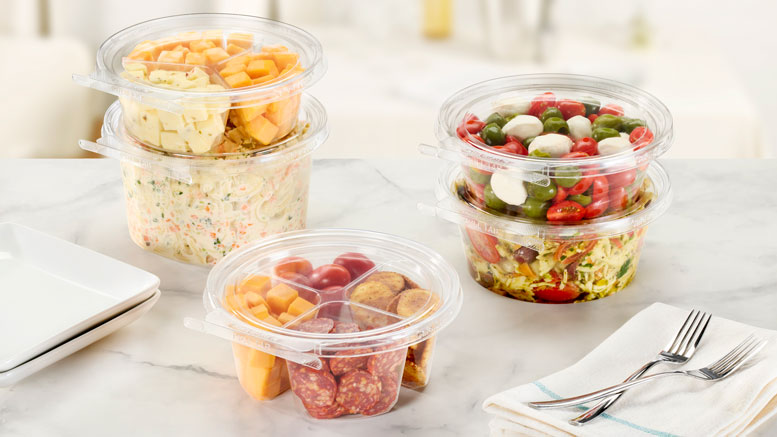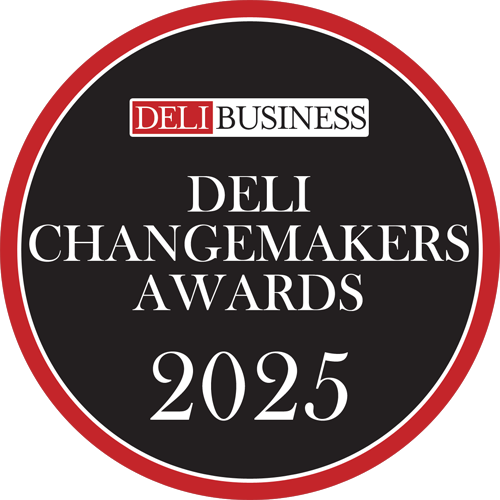Packaging Sustainability in the Deli
January 14, 2025 | 9 min to read
Sustainability is increasingly vital in the grocery sector, especially in supermarket delis, as consumer demand for eco-friendly practices rises. Retailers are embracing strategies like waste reduction and utilizing packaging made from post-consumer recycled content. Experts such as Joel Sawyer and Elizabeth Callinan highlight that sustainable packaging not only reduces environmental impact but also fosters brand loyalty among eco-conscious shoppers. While costs can be a barrier, the commitment to sustainability enhances brand reputation and supports a circular economy.

Discover the many benefits of operating with an eye on the environment.
Sustainability has become a big issue in recent years for consumers, as well as supermarkets and deli departments. No longer are initiatives to minimize carbon footprints, lower environmental impact or address climate change rare. Due to consumers’ awareness of the issue, this topic is now front and center.
According to FMI — The Food Industry Association, Arlington, VA, grocery retailers are embracing sustainability initiatives with strategies, including waste reduction through intelligent inventory management, eco-friendly branding practices, and enhanced traceability to ensure product sourcing transparency.
In the deli in particular, consumers and supermarket chains have become more conscious of the environmental impact of various types of packaging.
“They want packages that are not just recyclable but also are made from recyclable content to minimize the overall environmental impact,” says Joel Sawyer, sustainability and marketing manager, Placon, Madison, WI. “Supermarkets have responded by looking for suppliers who provide packaging that is clearly recyclable and is made with post-consumer recycled (PCR) content.”
Sustainability in supermarket delis is growing in importance, blending environmental responsibility with business opportunity.
“These busy food hubs are ideal for implementing eco-friendly practices, especially in packaging for grab-and-go selections,” says Elizabeth Callinan, assistant brand manager, Inline Plastics, Shelton, CT. “Adopting sustainable packaging reduces the environmental impact while appealing to eco-conscious consumers. For example, clear recycling instructions on packaging guide customers and reinforce the deli’s commitment to sustainability.”
She adds that this shift creates a positive cycle; recycled materials contribute to post-consumer recycled content, reducing the need for virgin resources.
“It’s a circular economy in action,” notes Callinan. “Sustainable practices also serve as an educational platform, cultivating environmentally aware shoppers and enhancing brand loyalty. This positions the retailer as a responsible corporate citizen.”
Looking at the big picture, environmental sustainability is top-down driven and good for the earth, environment and society.
“It’s bigger than the deli department, yet everyone has a part to play,” says Charles Pickering, principal and board member, Eatery Essentials, Dallas, TX. “But the expense is a huge piece, as sustainability isn’t always the most cost-effective approach. People must want to invest in sustainability.”
THE BENEFITS
Despite a higher price tag, retailers can reap many benefits when incorporating sustainable initiatives. First and foremost, by taking a front-and-center approach to sustainable practices, delis can stand apart in a competitive market, which widens the department’s appeal to a growing segment of shoppers.
“Embracing sustainability in deli operations is a transformative force, evolving the industry’s approach to environmental responsibility and consumer engagement,” notes Callinan.
“It elevates brand reputation, showcasing a commitment to conservation stewardship that resonates with green-oriented consumers. This approach contributes to the circular economy by supporting the production of post-consumer recycled materials. Importantly, it attracts and retains consumers who value transparency and responsibility.”

What is good for the planet can also be good for the bottom and top line.
“Offering products that are more efficient can drive more revenue dollars by attracting more consumers to the deli,” says Kimberlie Le, co-founder and chief executive, Prime Roots, Berkeley, CA. “It’s important to have options for consumers looking for sustainable solutions and products. Reports show that sustainability is a main purchase driver for Millennials and Gen Z shoppers.”
Delis also can lean into sustainability initiatives as a marketing tool to promote the department programs, notes Sawyer.
SURGE IN INNOVATION
The focus on sustainability at the retail level has been on environmentally friendly packaging.
Placon has seen an increase in stores looking for packaging with PCR content that can meet store and product sustainability requirements. PCR or post-consumer resin is an environment-friendly packaging option that is made from recycled plastics, most commonly PET and HDPE plastic products.
Placon’s stock food PET packaging is made with a new, environmentally friendly RPET (recycled PET) material called EcoStar 50S, which is material stock made to satisfy the U.S. PCR content requirements.
“We’ve also seen a large increase of customers requiring us to provide annual ESG (Environmental, Social and Governance) reporting on sustainability and energy savings initiatives, among other things,” says Sawyer.
Supermarket delis are seeking packaging solutions that prioritize both food safety and sustainability.
“We’re witnessing a surge in platters featuring tamper protection, recyclability and post-consumer recycled content,” notes Callinan at Inline Plastics. “For heat-and-eat meals, all-clear polypropylene packaging is gaining traction. This not only showcases food but also simplifies sorting for recycling. The addition of tamper evident, tamper resistance to all these packaging options provides an extra layer of security, appealing to safety-conscious consumers.”
In 2020, Inline Plastics launched the reborn initiative. All its PET products include 10% post-consumer recycled content, a claim verified by a third party, SCS Global.
“The Safe-T-Fresh family has expanded this year, adding platters, deli tubs, multi-compartment and a large portfolio of packaging options for grab-and-go salads,” says Callinan.
Launched in 2022, the company’s Safe-T-Chef polypropylene product line provided patented tamper protection for hot food applications. This line has expanded with anti-fog technology on vented options. In addition, Inline pre-qualified its products with How2Recycle, which standardizes labeling instructions to provide recycling instructions for consumers.
Multi-compartment packaging also has become more popular in deli innovations, as it allows a single container to house multiple food selections, eliminating the need for separate packages.
“Everyone is interested in sustainability and wants to understand costs, since sometimes price is a driving factor,” says Pickering. “Recyclability is the best opportunity there is.”
All of Eatery Essentials’ packaging is produced from PET, and its deli packaging is made of 30% recyclable content. In addition, the energy consumed in the company’s Dallas manufacturing facilities is sourced from 30% renewable energy sources.
“We work very closely with our partners to communicate that so they know we’re doing our part,” says Pickering. “We meet with stores’ top management, talk about sustainability and meet with their sustainability people.”
Most consumers are aware of packaging recyclability, and this is an ongoing initiative many Americans take part in.
“There is more homework being done on what the U.S. infrastructure can accept and the amount of information available,” says Kurt Richars, director of marketing and custom, Anchor Packaging, St. Louis, MO. “It’s critical that operators take a full life cycle view.”
Food contact packaging must be recyclable or compostable after use, so the focus needs to be on materials that are easy to recover.
In addition, instead of looking at packaging as an isolated component, it’s important to look at what it contains.
“Look at prepared foods, like rotisserie chicken where the footprint of the food is vastly different than its packaging,” explains Richars. “In this case, the chicken is 99%+ of the footprint, and its packaging is less than 1%.”
He notes that sometimes the most sustainable action an operator can take is to protect the food.
“Does the packaging do a good job merchandising the product so it gets purchased?” asks Richars. “And does the packaging protect food and keep its quality for longer? If so, more will be bought and eaten, and less will be wasted.”
The majority of Anchor Packaging’s products are polypropylene and PET.
“Sustainability can be used as leverage to expand a deli’s demographic,” notes Le. “And seasonal moments can be used for driving traffic.”
Case in point was Prime Roots’ Earth Day campaign last April, which brought more awareness to sustainability in the deli.
THE CHALLENGES
There are a number of challenges on the road to sustainability.
“Because there is a good amount of bad information out there, if operators have questions, it’s important to ask vendors, suppliers, producers or manufacturers,” says Richars. “Also, deli operators should make sure the move made has a net benefit; the packaging should provide added value to consumers and be recovered after use.”
Placon’s Sawyer notes sustainable packaging can be a challenge for some retailers who don’t want to pass additional costs on to consumers.
“Also, getting people to recycle, and local governments to invest in recycling infrastructure and education, can be challenging,” he says.
Balancing sustainability with performance is a delicate act, since incorporating higher percentages of post-consumer recycled content while maintaining quality and safety standards is a complex challenge.
“Navigating the sustainability landscape requires a discerning eye to avoid greenwashing pitfalls,” says Callinan at Inline Plastics. “It demands a deep understanding of sustainability principles and critical evaluation of materials and suppliers. While this process can be time-consuming and potentially costlier upfront, it’s crucial for building a genuinely sustainable brand that stands up to scrutiny and resonates with informed consumers.”
Delis are making strategic choices to boost their sustainability quotient where packaging is concerned.
“Retailers are prioritizing packaging that’s recyclable within their local communities and opting for products with third-party certified post-consumer recycled content,” says Callinan. “They’re choosing appropriately sized packaging to reduce waste and extend shelf life. But it doesn’t stop at selection; delis are actively educating consumers about proper recycling practices, empowering them to contribute to the sustainability cycle. It’s a holistic approach that considers the entire lifecycle of their packaging.”
“Retailers are prioritizing packaging that’s recyclable within their local communities and opting for products with third-party certified post-consumer recycled content.”
— Elizabeth Callinan, Inline Plastics, Shelton, CT
More operators are also asking for recyclable and recoverable packaging solutions.
“Commercial reuse is just beginning in some parts of the country, and is more prevalent in the bulk food aisle, but it’s coming because there is a lot of interest by consumers,” says Richars at Anchor Packaging. “In the meantime, some operators are providing containers that are consumer reusable like in the lunch meat aisle. Reports show that eight out of 10 consumers reuse containers they take home.”
Effective communication of a deli’s sustainability efforts starts from within.
“Empower staff with comprehensive knowledge about initiatives, enabling them to share this information confidently with consumers,” advises Callinan. “From management to the stockroom, everyone should be fluent in the sustainability story. Be transparent about both challenges and successes throughout the journey — this honesty builds trust and invites consumer engagement.”
He recommends cutting through the noise of greenwashing with clear, authentic messaging by utilizing multiple channels, like in-store signage, employee interactions, email newsletters and social media. Consistent and honest communication is key to connecting with environmentally conscious consumers.
“Ultimately, sustainability in delis is smart business,” says Callinan. “It reduces waste, attracts conscious customers and ensures long-term success in an eco-aware market.”
• • •
Incorporating Sustainable Products in the Deli
Some sustainability initiatives in the deli are easier to implement than others.
“Incorporating a plant-based program into delis is about newness, since it’s a different set of products,” says Kimberlie Le, co-founder and chief executive, Prime Roots, Berkeley, CA.
The company has built a program to support adding sustainable and plant-based products in delis as a turnkey solution that includes recipes.
“Identifying how to do it in the first place can be a challenge,” notes Le. “Delis can source more sustainable proteins and local items, and plant-based is an easy way to start.”
Prime Roots conducted a lifecycle analysis that found its offerings are about 90% to 95% more sustainable than traditional products.
“We use less resources to create our products, which have very clean labels,” she says.
Getting the word out on sustainability initiatives is key to capitalizing on the benefits and overcoming the challenges.
“Signage is really important, as is integrating sustainability into marketing initiatives,” says Le. “We’re trying to empower and encourage small swaps, so making smaller changes to add to the set can drive sustainability and more interest in it.”
37 of 82 article in DeliBusiness Winter 2024-2025

